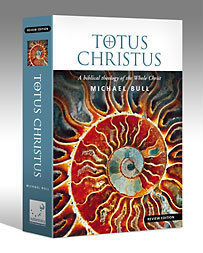Two Reviews
 .
.
Two reviews of the “review edition” of Totus Christus, one from a scholar and one from a student. Sincere thanks to both these readers for taking the time, especially Peter Leithart, who is a pastor, author and father of ten. He writes:
Mike Bull is a graphic designer in the wonderfully named Katoomba, New South Wales, who writes about the Bible. He’s produced a massive “biblical theology of the whole Christ” entitled Totus Christus. There are a lot of juicy details here, but the overall scheme is to follow the heptamerous chiastic pattern of Creation, Division, Ascension, Testing, Maturity, Conquest, Glorification from Genesis to the end of the Bible. Some of it feels forced and schematic, but overall it’s a lively introduction to a richer reading of Scripture. With a lot of quotations from James Jordan and me, it’s a good summary of what we’ve been up to for the past couple of decades.
The second review is from Kelby Carlson:
Totus Christus is an astounding book in many ways. It is one of the best excursus on symbol, typology and structure in the Bible I have ever had the great pleasure of reading. It is well-written and, in almost all cases, thoroughly engaging. So why am I bothering to write a review of it if I think it is so wonderful?
Well, despite this book’s many amazing characteristics, it has a deep flaw. This deep flaw many times impaired me from reading it, and I am very grateful I had the author to help clarify points as I went. And that’s the key word; clarify, which often Mike Bull does not do. He starts off by introducing the reader to the Dominion, Creation, and Feast patterns. However, he fails to really explain in any great detail what salient points these structures embody and the specific things one must look for. “Ascension” only takes on its intended meaning when you realize exactly what it means; that it combines a specific dominion step with a Firstfruits offering, and often uses a creation motif along with it. This is the way all of Bull’s structure works and I deeply wish he would consider re-organizing the book to provide a weightier introduction.
There are other points where often Bull does not seem to give enough detail (or substantiation) to some exegesis of a text. It seems obvious to him, I am guessing, and usually when you dig a little deeper it becomes blindingly inescapable. However, I think he has overestimated the lay-reader’s willingness to do this; even I, an interested armchair theologian, do not always want to try to scavenger hunt for specific answers when said answers could be so easily included. According to Bull, the five-point treaty structure is tremendously important; but he only directly deals with it a scant two or three times. He leaves the readers to infer the structure on their own; something which a beginner (or even an expert!) is not always capable of doing.
In Bull’s introduction, he states he wanted to provide a huge, jargon-free juggernaut as an introduction to biblical theology. Huge, juggernaut? Why sure it is, and I wouldn’t be at all averse to seeing it grow. But “jargon-free”? Far from it. There is a ton of jargon in this book, jargon that is very meaningful but sometimes not well explained. (Sometimes it is well-explained. But oftentimes it gets introduced, used a bunch, and then explained in detail later, which is not an approach that works well.)
So should you read it? Oh yes, yes you should. It is deeply thought-provoking, even paradigm-shattering. It saturated me in the Bible and now I see structures and deep meaning in many, many passages of Scripture. But for it to be truly effective it is going to need some heavy re-organization and some lengthening; I know that these things can be done, and I know they will make the book a true gem everyone will read and love.
TOTREVIEW


























October 2nd, 2009 at 11:54 am
I feel dumb, but how does one buy this book? Please email me.
October 2nd, 2009 at 12:02 pm
Hi Austin
You just passed the IQ test by asking. There are details here:
http://www.bullartistry.com.au/wp/2009/04/23/last-call-for-almost-freebies/
I have 1 copy left so will have to get some more printed.
December 5th, 2009 at 8:57 am
Ugh. Kelby’s review is how I often feel about Jordan and was hoping to avoid with TC. I may still venture into the purchase, though.